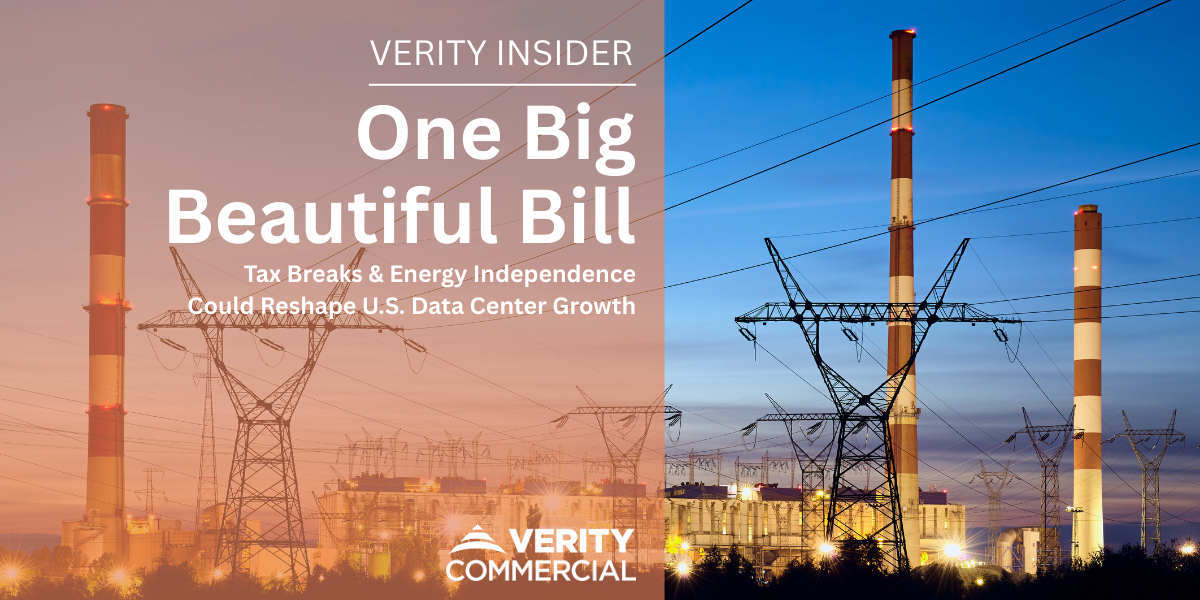One Big Beautiful Bill: Tax Breaks & Energy Independence Could Reshape U.S. Data Center Growth

Section 70307 of the Senate’s One Big Beautiful Bill could reshape how U.S. data centers invest in infrastructure and source their energy. While it offers immediate tax incentives for capital investment, it could transform the way large-scale energy consumers manage their own power supply. This has the potential to accelerate growth, resilience, and sustainability in the data center sector.
The bill represents a significant move to promote immediate capital investment in manufacturing and energy infrastructure. By allowing businesses to write off the entire cost of new equipment and facilities upfront, the provision could catalyze growth in critical sectors, bolster U.S. competitiveness, and help achieve broader economic and environmental goals. Stakeholders, including businesses and policymakers, will likely be watching closely how this provision is implemented and its subsequent impact on the economy and clean energy transition.
Why this Matters for Data Centers
Although not in the bill, and reflected in current legislation, President Trump’s remarks surrounding the bill regarding data centers potentially becoming their own utilities suggest a significant shift in how energy sourcing and management could operate, particularly for large energy consumers like data centers. Here are some key aspects of this development:
Future of Data Center Utilities
- Self-Utility Status: The idea of companies becoming their own utilities means they would have the ability to generate, distribute, and manage their own energy supply without relying on traditional utility providers. This can streamline energy access and improve reliability.
- Direct Generation: For data centers, this might involve investing in on-site energy generation technologies, such as solar panels, wind turbines, or co-generation systems. Such setups can provide a consistent energy supply and can also be more cost-effective over time.
- Regulatory Changes: The law change would likely involve adjusting regulations that currently limit or prohibit private enterprises from operating as utilities. This could include easing the permitting process and addressing regulatory compliance for energy generation and distribution.
Implications for Data Centers
- Increased Energy Independence: Data centers, which are significant consumers of energy, could gain more control over their energy sources and costs, reducing their dependence on local utility companies.
- Enhanced Reliability: Becoming their own utility would allow data centers to ensure constant and reliable energy supplies, which is critical for their operations that rely on uptime and data accessibility.
- Cost Management: By producing their own energy, data centers might be able to manage costs better and avoid fluctuations associated with utility rates or supply chain disruptions affecting grid energy.
- Sustainability Initiatives: Many data centers are increasingly focused on sustainability. Becoming their own utilities could allow them to integrate cleaner energy sources and implement energy-efficient technologies more readily.
Broader Context
- Energy Transition: This move aligns with broader trends in energy independence and self-sufficiency, where businesses and municipalities are looking for innovative approaches to energy management in light of climate change and energy volatility.
- Potential Impact on the Grid: If many data centers and other large consumers transition to self-utility operations, it could significantly impact local utility companies. This might lead to reduced demand on the grid and change the revenue models for utility providers.
- Emerging Technologies: Advances in energy storage, smart grid technologies, and renewable energy options would play a key role in enabling data centers to function as utilities. This would include battery storage systems that can store energy generated on-site for later use.
Challenges to Consider
- Regulatory Hurdles: Even with changes in the law, there may still be hurdles in implementing a self-utility model, such as navigating local regulations, obtaining permits, and ensuring compliance with safety and environmental standards.
- Capital Investment: Transitioning to self-utility status would require significant upfront investment for infrastructure, technology, and maintenance, which may be a barrier for some companies, especially smaller ones.
- Operational Complexity: Managing a utility operation adds complexity to business operations. Companies would need to invest in the expertise and resources to operate and maintain energy generation systems.
Conclusion
If President Trump’s statements translate into concrete legal and regulatory changes, they could fundamentally change the energy landscape for data centers, enabling them to operate more independently and sustainably. This shift may have broader implications for energy policy, utility companies, and the strategy large consumers adopt to manage energy consumption in an increasingly digital and data-driven economy. Stakeholders will be watching how this idea develops and the impact it may have on energy independence and sustainability initiatives in the corporate sector.
Next Steps
Connect with our experienced team to discuss your data center real estate investments. We’d be glad to set up a call or meeting to review site options, power needs, and a timeline.

Comments